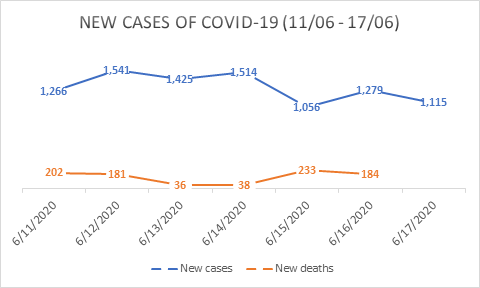This is the thirteenth of a series of bulletins produced by ISE to update members on key data and policy on Covid-19. This bulletin just covers the period 11/06/2020-17/05/2020.
You can access all of the Covid-19 bulletins on the ISE website.
The week in Covid-19

Data taken from Wikipedia and from the government’s Number of coronavirus (Covid-19) cases and risk in the UK webpage.
Note that we have changed the summary data that we are presenting this week. We have moved from presenting overall cases (currently 298,136) and overall deaths (currently 41,969) to presenting the number of new cases as this provides better context to the government’s aim of bringing the UK out of lockdown.
- The Office for National Statistics estimate that 0.06 of the British population have Covid-19 and that the number of people testing positive is trending downwards.
- The poorest areas of England and Wales have been hit hardest by Covid-19.
Ending lockdown
Politics and policy
- Labour calls for full emergency summer Budget and stimulus.
Education
- Some young people have returned to school, but the country is still a long way away from a normal education system. Headteachers say that unclear and rapidly changing government guidance is partially to blame.
- Government plans to organise a ‘summer catch up’ remain unclear, with schools and local authorities revealing that they have not been consulted.
- Sixth formers have now made their final choices about which university to study at. But many have found this decision difficult in the current climate.
- The Higher Education Policy Institute publishes its annual student experience survey. In it many students raise concerns about value for money in a difficult year for higher education.
- Universities struggle to ‘keep all the balls in the air’ (Commentary from Tristram Hooley)
Economy
- The global economy looks shaky with the OECD reporting that most countries have gone into recession and suggesting that the UK will be hit worst.
- The lockdown led to a spike in inflation and a reduction in product variety.
- The growing recession is increasing inequality in Britain.
- The Economic Observatory on Covid-19 and the economy.
Labour market
- The number of job vacancies remains very low in comparison with last year. Further analysis of labour market data is provided by the Learning & Work Institute and the Institute of Employment Studies.
- Debate begins about what will happen after the furlough scheme is ended with some predicting a massive spike in unemployment. The Learning & Work Institute propose the need for a ‘plan for jobs’ while Tony Wilson sets out his own plan for the government.
The student labour market
- The virus is having a big impact on young workers.
- Charlie Ball provides his weekly graduate labour market update. Meanwhile Martin Edmondson argues that Covid-19 is making the graduate labour market increasingly difficult to understand.
- The Youth Employment Group calls for the government to ensure that young people are supported in any economic and labour market policies that are developed. In an open letter to the Prime Minister they argue that the government needs to launch an opportunity guarantee. Other commentators like Neil O’Brien are also proposing new youth employment policies.
Recruiting during Covid-19
- Recruitment processes in the autumn look set to change radically. The ISE has been discussing this extensively in a webinar entitled A virtual autumn? A guide to campus marketing, a podcast Insight into employer and university responses to Covid-19 and in the blog How is Covid-19 changing student attraction?
- Social mobility and student recruitment (ISE webinar)
- Jobcentre Plus launches Jobhelp for jobseekers and Employerhelp for employers to provide advice on recruitment during Covid-19.
Employers insights
The following insights are based on ISE’s interactions with employers during the period covered by this briefing.
- Virtual careers fairs. Many firms are switching to virtual careers fairs for the autumn. However, some are concerned about whether these are really going to offer good value for money.
- Diversity. Employers report challenges in meeting the needs of disabled students as many of their usual processes and adaptions are not in place.
- Induction and onboarding. Some firms have started (virtually) onboarding summer interns. Others are still developing their onboarding processes for later in the summer.
- Geography. Most firms are being relaxed about where new starters are physically based. However, there are concerns about whether it is possible for students to do internships from overseas. E.g. shipping equipment. With respect to UK based students firms are encouraging managers to be flexible about when students need to relocate.
- Digital HR issues. Some firms are reporting new types of inter-personal conduct issues being conducted through online tools. There is a need to address netiquette and cyber bullying in inductions and line management.


0 Comments